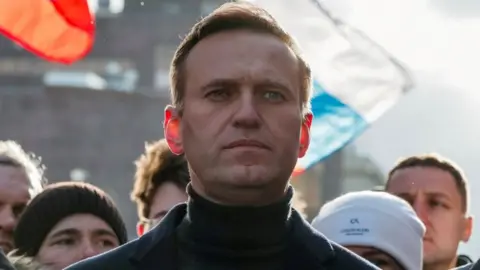Alexei Navalny: Moscow court outlaws 'extremist' organisations
 Reuters
ReutersA court in Moscow has banned political organisations linked to the jailed Kremlin critic, Alexei Navalny, classifying them as "extremist".
Activists will risk prison sentences if they continue their work and anyone who publicly supports Mr Navalny's political network can now be barred from running for public office.
Writing on social media, Mr Navalny promised he would "not retreat".
However, he said his supporters would now have to change how they work.
Mr Navalny is in prison for violating the terms of parole in an embezzlement case - charges he says are politically motivated.
Russian parliamentary elections are due to take place in September and opinion polls show the ruling party losing support. Some of Mr Navalny's supporters have been planning to run in the elections.
Following Wednesday's ruling, a court statement said Mr Navalny's regional network offices and his Anti-Corruption Foundation (FBK) had been banned with immediate effect.
"It was found that these organisations not only disseminated information that incited hatred and enmity against government officials, but also committed extremist actions," prosecutors' spokesman Alexei Zhafyarov said outside the court.
Mr Navalny's lawyers said they would appeal against the ruling.
A message later posted on Mr Navalny's Instagram account said: "We're not going anywhere. We'll digest this, sort things out, change, and evolve. We'll adapt. We won't step back from our aims and ideas. This is our country and we do not have another one."

Paranoia in the corridors of power

The "extremist" label could have serious consequences for supporters of Alexei Navalny and his political movement. Activists can be threatened with jail if they continue their work and individuals linked to or publicly supporting Mr Navalny's political network can be barred from running for public office.
And it just so happens that there is an election coming up in Russia: for parliament, in three months' time. The Russian authorities are going to extraordinary lengths to prevent opponents from taking part in it. A major crackdown on dissent is under way. Just a few days ago, a prominent Kremlin critic Dmitry Gudkov left the country, he says under pressure from the authorities.
Why is the Kremlin so nervous? After all, President Putin's supporters enjoy pointing out that, according to opinion polls, Alexei Navalny has minimal support amongst the Russian public.
What is happening reflects the level of fear and political paranoia in the corridors of power here. With the ruling party increasingly unpopular, the Kremlin may worry that, amid economic problems and with no end in sight to the Coronavirus pandemic, its opponents could do well at the ballot box. That is something the Russian authorities are determined to prevent.

Mr Navalny - President Putin's foremost critic - was detained in January as soon as he returned to Russia from Germany. He had received treatment in Berlin for a nerve agent attack in Siberia last August that left him in a coma and fighting for his life.
Mr Navalny blamed President Putin directly for the attack which nearly killed him. The Kremlin denied any involvement.
The pro-Putin United Russia party, which dominates parliament, has been described by the opposition leader as "the party of crooks and thieves", and millions of Russians have watched his videos alleging corruption in Mr Putin's elite circle.
Mr Navalny is expected to be a topic on the agenda of talks between Mr Putin and US President Joe Biden at their first summit on 16 June.
Mr Putin, who has been in power as either president or prime minister since 1999, recently said he hoped the Geneva meeting would improve the "extremely low level of relations" between the two countries but expected no breakthroughs.
